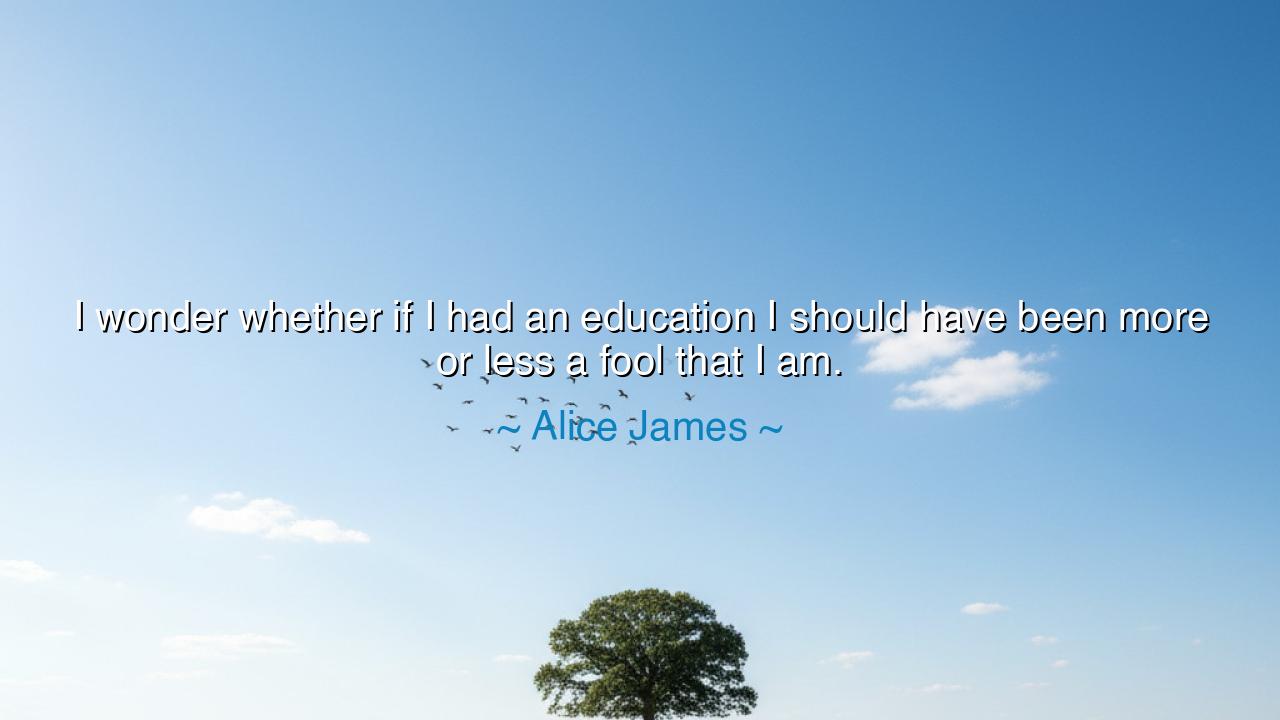
I wonder whether if I had an education I should have been more or
I wonder whether if I had an education I should have been more or less a fool that I am.






In the words of Alice James: “I wonder whether if I had an education I should have been more or less a fool than I am.” These words strike like a bell in the stillness, not merely confessing doubt but unveiling the eternal tension between learning and wisdom. For education is often praised as the path to enlightenment, yet Alice James reminds us that it can also be a cloak for folly, if pursued without reflection. To be schooled in books is not always to be schooled in life, and many a man with vast education has been proved more foolish than the humble soul who listens deeply to the truths of existence.
The ancients themselves wrestled with this paradox. Socrates, the wisest of Athenians, declared that his wisdom lay in knowing that he knew nothing. The learned men around him—scholars, poets, politicians—were filled with knowledge but lacked humility. They were fools clothed in brilliance. Socrates, though denied titles and honors, shone brighter than them all, for he understood that education without self-knowledge is emptiness. Alice James, in her quiet observation, touches this same truth: that one may wonder whether more schooling would refine the self or merely sharpen the edges of folly.
History offers many mirrors. Consider the tale of Diogenes, the Cynic philosopher, who mocked the so-called wise men of Athens. He carried a lantern in broad daylight, saying he sought an honest man. Though unlearned by formal standards, his biting truths exposed the hypocrisy of the educated elite. His lack of conventional education did not diminish him—it gave him clarity, stripping away illusions. Meanwhile, others, rich in study, were blind to their own arrogance. This story shows us that the line between wisdom and folly lies not in the presence of learning, but in how one uses it.
Alice James herself lived in the shadow of her famous brothers, Henry and William James—one a novelist, the other a philosopher and psychologist of renown. She, by contrast, was denied formal education and confined by illness, yet her diaries shine with piercing wit, humor, and insight into human nature. Her words challenge us to ask: was she truly a fool, or did her unorthodox life grant her a wisdom that her brothers, with all their learning, sometimes missed? Perhaps her so-called “lack” of education freed her to see life more sharply, stripped of academic pretension.
Thus her quote becomes both lament and revelation. It is the lament of a woman denied the education that society granted her brothers, yet it is also a revelation that wisdom is not guaranteed by schooling. One may study philosophy and remain blind to truth; another may dwell in solitude and uncover it with piercing clarity. The question she raises is not one of self-pity but of universal importance: does education make us wise, or does it sometimes sharpen our capacity for folly?
The lesson is clear: seek education, but do not idolize it. Learning is a tool, not a crown. It can make you humble, or it can make you proud; it can awaken your soul, or it can lull you into false security. What matters is not the accumulation of facts, but the cultivation of discernment. True wisdom is born when knowledge is wedded to humility, when intellect bows to conscience, when learning serves love.
Therefore, O seeker, take this teaching to heart: pursue education, but guard your soul against arrogance. Read widely, but reflect deeply. Learn eagerly, but never forget the wisdom of silence, the lessons of experience, the truths spoken by those who never entered a classroom. For in the end, as Alice James reminds us, the measure of a fool or a sage lies not in how much one has been taught, but in how one has learned to live.






AAdministratorAdministrator
Welcome, honored guests. Please leave a comment, we will respond soon